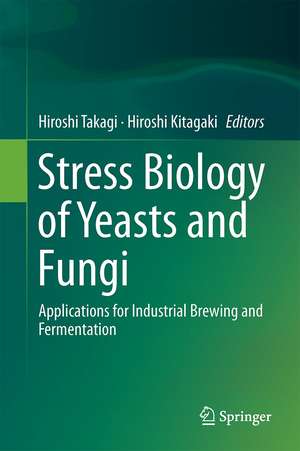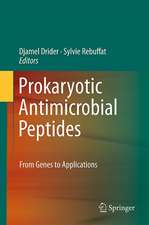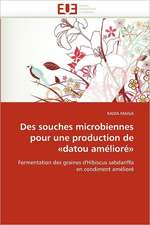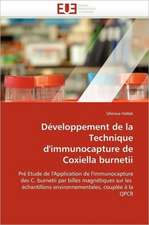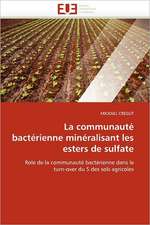Stress Biology of Yeasts and Fungi: Applications for Industrial Brewing and Fermentation
Editat de Hiroshi Takagi, Hiroshi Kitagakien Limba Engleză Hardback – 18 mar 2015
The fundamental studies described in this book can be applied to the breeding of useful microbes (yeasts, fungi), the production of valuable compounds (ethanol, CO2, amino acids, organic acids, and enzymes) and the development of promising processes to solve environmental issues (bioethanol, biorefinery).
| Toate formatele și edițiile | Preț | Express |
|---|---|---|
| Paperback (1) | 779.25 lei 38-44 zile | |
| Springer – 8 oct 2016 | 779.25 lei 38-44 zile | |
| Hardback (1) | 947.35 lei 43-57 zile | |
| Springer – 18 mar 2015 | 947.35 lei 43-57 zile |
Preț: 947.35 lei
Preț vechi: 1155.30 lei
-18% Nou
Puncte Express: 1421
Preț estimativ în valută:
181.33€ • 197.03$ • 152.42£
181.33€ • 197.03$ • 152.42£
Carte tipărită la comandă
Livrare economică 21 aprilie-05 mai
Preluare comenzi: 021 569.72.76
Specificații
ISBN-13: 9784431552475
ISBN-10: 4431552472
Pagini: 218
Ilustrații: VIII, 218 p. 60 illus., 30 illus. in color.
Dimensiuni: 155 x 235 x 15 mm
Greutate: 0.5 kg
Ediția:2015
Editura: Springer
Colecția Springer
Locul publicării:Tokyo, Japan
ISBN-10: 4431552472
Pagini: 218
Ilustrații: VIII, 218 p. 60 illus., 30 illus. in color.
Dimensiuni: 155 x 235 x 15 mm
Greutate: 0.5 kg
Ediția:2015
Editura: Springer
Colecția Springer
Locul publicării:Tokyo, Japan
Public țintă
ResearchCuprins
1 The Breeding of Bioethanol-Producing Yeast by Detoxification of Glycolaldehyde, a Novel Fermentation Inhibitor.- 2 Stress Tolerance of Baker’s Yeast During Bread-Making Processes.- 3 Yeast mRNA Flux During Brewing and Under Ethanol Stress Conditions.- 4 Mechanism of High Alcoholic Fermentation Ability of Sake Yeast.- 5 Stress Responses of the Yeast Saccharomyces cerevisiae Under High Hydrostatic Pressure.- 6 Environmental Stresses to Which Yeast Cells Are Exposed During Bioethanol Production from Biomass.- 7 Mechanism of Yeast Adaptation to Weak Organic Acid Stress.- 8 Nutrient Stress Responses of the Bottom-Fermenting Yeast.- 9 Unique Metabolic Responses to Hypoxia and Nitric Oxide by Filamentous Fungi.- 10 Cell Wall Biosynthesis in Filamentous Fungi.- 11 Stress Responses of Koji Mold Cells with Highly Polarized and Multicellular Morphology.- 12 Protein Kinase C of Filamentous Fungi and Its Roles in the Stresses Affecting Hyphal Morphogenesis and Conidiation.- 13 Response and Adaptation to Cell Wall Stress and Osmotic Stress in Aspergillus Species
Textul de pe ultima copertă
This book describes cutting-edge science and technology of the characterization, breeding, and development of yeasts and fungi used worldwide in fermentation industries such as alcohol beverage brewing, bread making, and bioethanol production. The book also covers numerous topics and important areas the previous literature has missed, ranging widely from molecular mechanisms to biotechnological applications related to stress response/tolerance of yeasts and fungi. During fermentation processes, cells of yeast and fungus, mostly Saccharomyces and Aspergillus oryzae spp., respectively, are exposed to a variety of fermentation “stresses”. Such stresses lead to growth inhibition or cell death. Under severe stress conditions, their fermentation ability and enzyme productivity are rather limited. Therefore, in terms of industrial application, stress tolerance is the key characteristic for yeast and fungal cells. The first part of this book provides stress response/tolerance mechanisms of yeast used for the production of sake, beer, wine, bread, and bioethanol. The second part covers stress response/tolerance mechanisms of fungi during environmental changes and biological processes of industrial fermentation. Readers benefit nicely from the novel understandings and methodologies of these industrial microbes. The book is suitable for both academic scientists and graduate-level students specialized in applied microbiology and biochemistry and biotechnology and for industrial researchers and engineers who are involved in fermentation-based technologies.
The fundamental studies described in this book can be applied to the breeding of useful microbes (yeasts, fungi), the production of valuable compounds (ethanol, CO2, amino acids, organic acids, and enzymes) and the development of promising processes to solve environmental issues (bioethanol, biorefinery).
The fundamental studies described in this book can be applied to the breeding of useful microbes (yeasts, fungi), the production of valuable compounds (ethanol, CO2, amino acids, organic acids, and enzymes) and the development of promising processes to solve environmental issues (bioethanol, biorefinery).
Caracteristici
Includes abundant information on stress response/tolerance mechanisms of yeasts and fungi
Provides important data on the characteristics of fermentation microbes such as Saccharomyces and Aspergillus spp.
Covers practical fermentation technologies (alcohol beverage brewing, bread making, and bioethanol production)
Provides important data on the characteristics of fermentation microbes such as Saccharomyces and Aspergillus spp.
Covers practical fermentation technologies (alcohol beverage brewing, bread making, and bioethanol production)
